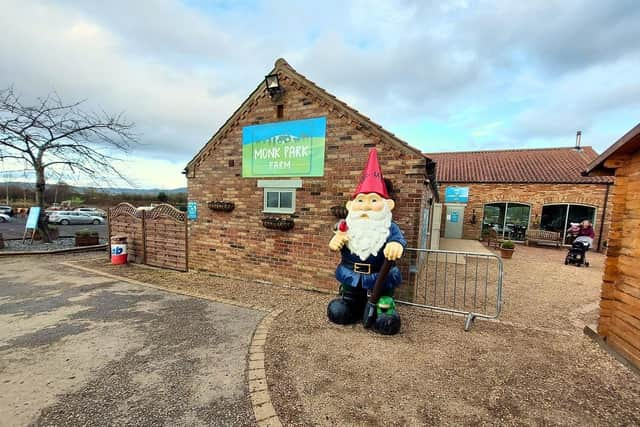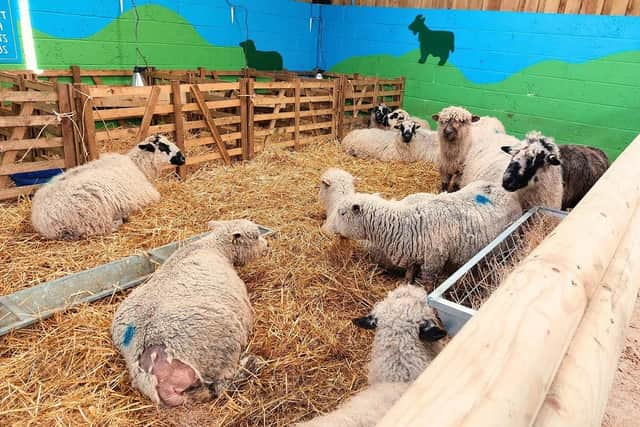Monk Park Farm: Yorkshire farm opens to public during lambing season for the first time and host talks to educate people about how the process works
Monk Park Farm was bought by new owners in February 2021 and before the re-opening in April of that year, the entrance, toilets and cafe were refurbished, the outdoor play area was improved and a new sandpit was added.
While the farmers posted videos on social media of the lambing process for the public, they have decided to open the farm to the public during lambing season for the first time, an event known as ‘Lambruary’.
Advertisement
Hide AdAdvertisement
Hide AdGeneral manager of Monk Park Farm, Mark Navin told The Yorkshire Post: “Currently we are slap-bang in lambing time.


“We breed our sheep so they can give birth in February which means by the time spring and summer comes around they are fit, strong lambs and we have never opened to the public at this time of year before, we’ve decided to open up.
“I came to the business in November [2023] from another farm park in Manchester. Part of what I did there was a lambing event in February and as much as we did it for the farmers, we thought let’s get the public to come and see this because it’s really interesting and that’s what we’re doing.
“We’re posting a lot of videos on social media, some of them quite graphic, to show people the lambs being born. We get people in, we do talks about how sheep are born, complications that may arise, our farmers do about two to three talks a day for the public to educate them and to [give them the opportunity] to see all the cute lambs.”
Mr Navin described the process of lambing.


Advertisement
Hide AdAdvertisement
Hide Ad“Normally we go around with a tup around, the tup is a male sheep, we put [ewes] with the tup on Bonfire Night and then they give birth around Easter time, that’s the farming way,” he said.
“But we try to do it earlier, so we did some of these in September so they could give birth now. The timing is literally to the day.
“What we do is come check on them every night, most of them give birth on their own quite well; we push out a water sack. They’ll have spots on their back that tell you how many [lambs] they’re having, we scan them, do a pregnancy scan, so we know how many they’re having.
“We mark them so we know if she’s having three [babies] and she’s only [given birth to] two, there’s another one to come, just to make sure. When they give birth we’ll look after them. Most of them will have twins, our ones have triplets, some have singles, but twins are the most common.
Advertisement
Hide AdAdvertisement
Hide Ad“We are always on hand to keep an eye [on them] because being sheep, they just like to do things [differently]. You find that they have breech births which is quite a common thing; sometimes the ewes can’t push them out, they get tired and when they can’t stop giving birth it stresses the lambs.
“We’re on hand to get our arm in, feel what’s going on and help give birth, we have to do that with 50 per cent of them. We try to capture it on film and sometimes when the public are here they can see it and people are bewildered by it, they’re amazed that this is what actually goes on.”
An important part of the farm’s development is to try to educate school children about farming and the tasks required.
“We encourage a lot of school trips, so we contact all schools within a 40 mile radius to see if they want to come to the farm,” Mr Navin said.
Advertisement
Hide AdAdvertisement
Hide Ad“We do tailored education programmes depending on the curriculum, what the teachers are doing. We always confide in the teachers and ask them ‘what are your topics this term, let’s see if we can turn them into farming analogies’, so counting; how many lambs have we had, how many teeth do they have, there’s lots of things with numbers.
“Science is quite big because again; why did they need the first drink of milk which is full of cholesterol? It actually promotes healthy guts and gives the lamb a vaccination.
“Even though they are primary school children we still teach them that because it does stick, it sticks with a lot of them and then if they’ve heard it before they are more likely to take it onboard when hearing it at school.”
A focus for the future is to increase employment at the farm.
Advertisement
Hide AdAdvertisement
Hide Ad“The bigger the business the more people we can employ,” Mr Navin said.
“We are already a decent employer in the area. I’d like to triple that in the next five years; I’d like to employ about 100 people in the next three years, that’s my aim, because the site can do that. It’s got a bright future.”
Comment Guidelines
National World encourages reader discussion on our stories. User feedback, insights and back-and-forth exchanges add a rich layer of context to reporting. Please review our Community Guidelines before commenting.
